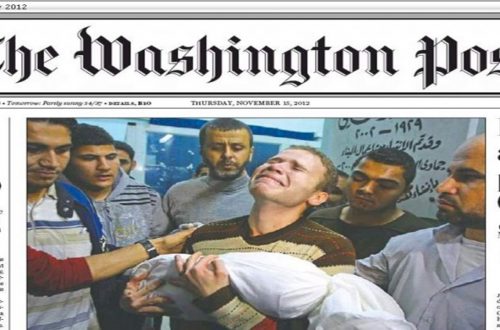This is a guest post by Alex Stein of falsedichotomies.com
“this style of writing [hysterical-realism] is not to be faulted because it lacks reality – the usual charge against botched realism – but because it seems evasive of reality while borrowing from realism itself. It is not a cock-up, but a cover-up.” James Wood, Human, All Too Inhuman, New Republic (30.8.01)
Max Blumenthal is back! The agit-prop journalist who created the already-seminal YouTube documentary Feeling the Hate in Jerusalem has now released the equally sophisticated sequel, Feeling the Hate in Tel Aviv. The original, which received 400,000 hits on YouTube, depicted American-Jewish teenagers (for some reason described by the filmmakers as Israelis) hurling racist obscenities at Barack Obama during a drunken night out in Jerusalem, and caused a predictable storm about authenticity and the morality of airing one’s dirty laundry in public. Now, it’s Tel Aviv’s turn.
Blumenthal describes the aim behind the video succinctly: “On May 27th, journalist Jesse Rosenfeld and I set out on the streets of Tel Aviv to probe the political opinions of young local residents.” This was a pre-emptive response to criticism he received from Haaretz journalist Benjamin Hartman, who suggested that the Jerusalem video was “circling the internet at a critical velocity on a mission to humiliate the Jewish people,” before suggesting that he go to Tel Aviv to get a more balanced look at Israeli society.
But ha-ha! “Unbeknownst to Hartman,” Blumenthal writes, “I had already filmed my next segment in Tel Aviv.” And guess what’s in the video? More of the same. They began the day at Tel Aviv University, talking to students who had gathered to protest the ‘Nakba Law’ that proposes criminalizing public commemoration of the losses suffered by the Palestinians in 1948. There they found “a group of students who gathered to heckle their Arab classmates and demand their deportation,” as well as two “genial business students” who expressed support for the Nakba Law. [Even these descriptions, by the way, are exaggerations – watch the video and judge for yourself] Later that night, they covered White Night, where “a group of teenagers launched into a virtually unprompted diatribe against Barack Obama, referring to him as a Nazi, a Muslim, and a “Cushi”, which is Hebrew slang for “nigger.” In the Blumenthalian universe, there is little daylight between Israel’s two leading cities.
It would be naïve to argue that Blumenthal’s video does not in some way reflect authentic trends in Israeli society. There is plenty of evidence, anecdotal and otherwise, that Israel is steadily moving in an openly-racist, authoritarian direction, and I see no problem with discussing this issue openly. Feeling the Hate in Tel Aviv, however, is too real, condemned as inaccurate by the dog that didn’t bark. It is impossible that somebody could spend a serious amount of time interviewing Israelis in Tel Aviv (or indeed any other Israeli town) without finding a single voice expressing more progressive sentiments. Israeli society may be moving to the right, but it is far from monolithic.
Blumenthal’s methods are about as sophisticated as Borat’s or Bruno’s. He picks weak targets: in this case, the English of the Jewish interviewees is never more than passable, in contrast to the Palestinians. As one commenter puts it, he puts “smart, articulate Palestinian students…up against drunk arsim,” comparing this to interviewing an “intelligent, liberal professor from Columbia,” and putting him up against “some white trash from Alabama.” He goes to White Night and manages to interview a single group of drunken teenagers. Was there other footage? Why are we not privy to it? He goes to a Tel Aviv University where feelings are likely to be running high, without providing any context, and grabs the most inarticulate passers-by he can find, including one man who is absurdly described as a ‘Jewish-Druze’ (he has clarified this in a subsequent post, but the original caption demonstrates a basic lack of understanding of Israeli society), reflecting the strange description of the subjects of Feeling the Hate in Jerusalem as Israelis. His methods are cheap.
Doing a serious vox-pop in Tel Aviv is not a complicated task: Spend the entire day going from café to café, neighbourhood to neighbourhood, hummuseria to sushi bar, interview people and then edit it in such a way that accurately reflects the multiplicity of voices that you hear. In this case, there is simply no evidence that Blumenthal has bothered to be this rigorous. And the reasons for this are clear. He has long ago drawn his conclusions about Israeli society, and is now simply gathering the evidence to back it all up, rather than going from evidence to conclusion. This is the work of a propagandist – a deeply unserious approach to a deeply serious problem.
Yes there is “crude racism,” “bellicose nationalism,” and “anti-democratic sentiments” in Israel. But there is a lot more going on as well. Blumenthal is doing a disservice to those who want to gain a fuller picture of Israeli society by refusing (and that can be the only word for it) to depict these complexities and nuances in the film. It is very easy to find what you are looking for, and rather harder to be open to being surprised. Blumenthal tells a story about two Palestinians arrested for speaking Arabic on the bus. I have also heard stories of this nature, but I have also heard people frequently speak Arabic throughout Tel Aviv, and I can honestly say I have never seen anyone encounter any trouble as a result. Does this mean Blumenthal is mistaken? Not necessarily. But he has to acknowledge the limitations of the anecdote as a journalist device.
The same applies to interviewing a handful of people in Tel Aviv and calling it a wrap. Blumenthal has taken a single insight and inflated it into a grand theory of Israeli society, a theory far beyond his basic means of analysis. He may be feeling smug about answering his critics with this latest video, but if he has any pretensions to seriousness he should begin to seriously examine his methods.


